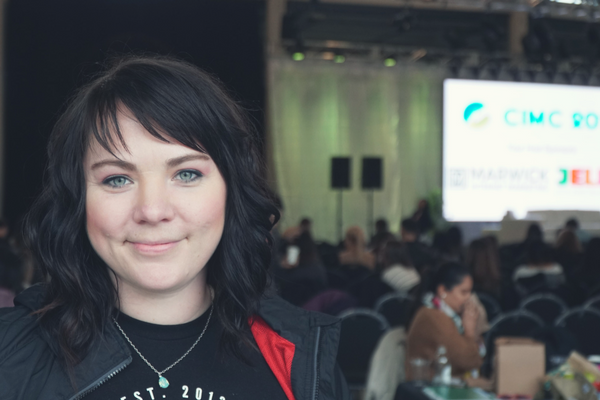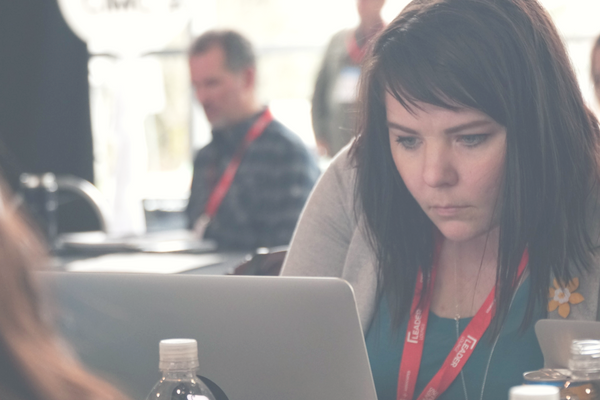
In April of 2016 I had the opportunity to volunteer for the Change In The Making Conference (CIMC). One year later I returned to the same conference, this time not as a volunteer, but as an attendee and employee of one of the event sponsors, Jelly Digital Marketing & PR.
Being at the same conference a year later but in such a different capacity made me question the value of my volunteer time.
What had it been worth?
And then I began to wonder what on earth I even meant by worth. Could I assign value to a volunteer experience?
The Backstory (Yes. This Matters)
In April 2016 I was a former Kindergarten teacher who had fallen in love with digital marketing and quit her teaching gig to become … ta-da …. a Junior Administrative Assistant.
I thought I could land an online marketing job pretty quickly, but, as it turned out most companies didn’t want to hire a Kindergarten teacher onto their marketing teams. Being really darn good at singing my way through the solar system didn’t exactly translate skill-set wise.
So I began to identify the skills that I lacked, and I hustled to bridge the gap. A significant part of that bridge-building was my volunteer experience at CIMC.
Today, a year later, I’m wondering if there’s a way to determine the value of that time. Not only that time, but volunteering in general.
This leads me to three big questions:
- Does determining the value of an experience matter?
Does it even really matter if it mattered? Should we bother assigning value to it? Can’t we just say that it happened and we either enjoyed it or didn’t and leave it at that? - Can we measure the value of volunteering?
Are there even metrics for that? Is there an equation to determine worth of freely given time? - Who should benefit from volunteering?
Should you benefit? Should the people you’re serving benefit? Are the benefits exclusive or can everyone experience value from volunteerism? I mean, it’s volunteering after all. Shouldn’t we just do it for the sake of being good humans? You know, give back a little? Contribute just to contribute?
Question One: Does Determining The Value Of An Experience Matter?
As human beings, we’re constantly determining value of our experiences. Subconsciously or consciously, we’re always in the process considering, weighing, calculating, and assigning value to our experiences.
Heck! If you even read that last sentence it means that you determined that the value of this blog post is worth your time.
That’s a hefty exchange!
So, should we bother trying to assign value to our experiences?
Should we take the time to figure out if they were worth it?
Yes!
Of course we should.
Here’s why evaluating experiences matters:
- We discover if we want to do it again.
- We can confidently support others who may seek out our counsel based on our experiences.
- Evaluation and reflection allows us to glean any additional knowledge-nuggets, either about the experience or ourselves. It helps us grow.
Question Two: Can we measure the value of volunteering?
We should start by figuring out what we are measuring.
First, let’s understand that for the purpose of this blog post we’ll be using my experience as an example, but these concepts are generally transferable.
Second, let’s agree that my volunteer time at CIMC wasn’t humanitarian, but it was human. My primary responsibility was to serve others – both my volunteer coordinator and my volun-peers, as well as the CIMC guests, speakers and media.
In exchange for serving others freely, volunteers were offered the opportunity to listen to world-renowned speakers, gain top-notch insight into digital trends, and rub shoulders with industry leaders and influencers.
Oh!
And we got free food truck lunches and all the snacks and coffees our little hearts could desire.
#FreeFoodForTheWin!
So, is this type of exchange measureable?
Maybe.

Calculating The ROI of Volunteering
The basic formula for ROI looks like this:
Net Profit / Total Investment * 100 = ROI %
Mmmk … so now we take a human experience and we monetize it.
My Total Investment including hotel, fuel, tolls, lost wages and meals was $490.
The Net Profit, or financial value of CIMC including 2 days of general admission and lunches was $839.69
| Net Profit | Divided by | Total Investment | Multiplied by | Equals ROI |
| $839.69 | / | $490 | X 100 | 171% |
HOLY BANANAS BATMAN!
That’s a return on investment of 171%!!!
That’s a crazy-town number!
Ok, but wait, though.
I didn’t actually profit financially.
There was no money ever exchanged. In fact, I spent considerably more money than I earned.
Money Wasn’t The Point
The point was to earn knowledge and gain the opportunity to be around people who knew more about the stuff I was interested in than I did.
Canada’s 150 for 150 Challenge defines volunteerism as “a movement whereby citizens donate/give their time freely and willingly for the common good/public benefit without monetary or financial gain.”
But without units of measurement like dollars and cents, can we still determine value?
Maybe instead of an ROI formula, we need to consider it more like a weighted scale. And instead of dollars we can use time exchanged as the unit of measurement.
Using Time As the Unit Of Measurement
This nifty chart identifies the amount of time exchanged, and then it allows us to compare volunteer time spent at CIMC against experiences gained.
| Time Exchange | Volunteer Tasks | Experience Gained |
| 6.5 hours |
|
|
And that was just day one!
I exchanged 2-days worth of my regular life for 2-days of new experiences and exposure to the latest and greatest ideas, tools, gadgets and people in the industry, and it only cost me about 13 hours of my time.
This method of measurement certainly isn’t scientific and is undoubtedly flawed, but it’s easy to see that the exchange of time had overwhelming benefits and value.
- I learned a ton from top-notch speakers and panelists.
- I met peers in the industry.
- I tried networking and totally failed at it, but hey! I identified a gap in my skill set.
- I live tweeted at an event for the first time ever, and got retweeted. Talk about a massive confidence booster!
All in, was volunteering for CIMC 2016 worth it?
Yes! Absolutely!
But is that ok?
Perhaps in the end, it’s not worth assessing at all because I stood to gain so much?
Question Three: Who should benefit from volunteering?
If we determine that there are personal gains to be made by volunteering, and we offer our time anticipating those benefits, does that make us selfish? Are there circumstances where volunteering might not benefit us or where we might not be able to identify value? Do the benefits of volunteer time need to be exclusive or can each party involved experience value?
I’m no expert, but here are my quick thoughts:
1.) We only ever stand to gain as much as we are willing to earn.
In any circumstance, we have to choose to push past real or imagined barriers in order to claim each available opportunity that can positively impact our lives.
We might not claim them all.
Fear, uncertainty and exhaustion might get in our way, but no matter what, the opportunities and experiences we earn are ours to benefit and learn from regardless of if we are volunteering or not.
Going to CIMC alone was super intimidating and at times, uncomfortably awkward.
- There were employers at the event who had rejected me,
- I didn’t know enough about the industry to hold a clever conversation,
- and I felt like a goofy dweeb. Digital marketers are a cool bunch of smart, beautiful people. Kindergarten teachers are used to walking around singing about stuff. The dichotomy is a tad intimidating.
2.) There are natural benefits that come from volunteering
There are tons of great articles about the professional, physiological, sociological, and psychological benefits that are a natural part of any volunteer experience.
If you want to learn more I suggest starting with Psychology Today’s 5 Reasons Why You Should Volunteer, and The Physiological Power of Altruism article from The Atlantic. If that doesn’t satiate your curiosity, get your Google on and start researching. You’ll find oodles of cool stuff.
The point here is, whenever you give your time for others or for a cause, you will naturally experience positive benefits. What exactly those benefits are is for you to evaluate.

Conclusion:
While it’s always important that you examine your own motives, volunteering offers natural, positive value for you while you provide value for others.
For me, volunteering at CIMC in 2016 was tremendously valuable. It was hard, scary and embarrassing – and easily one the smartest things I did while I was switching careers.
Not only was I able to parlay some of the connections I made at CIMC into long term friendships and professional relationships, I learned a whackload of stuff that I applied to my pursuit of a new career and I was eventually able to score a pretty sweet job.
So go volunteer somewhere.
Anywhere!
Volunteer for something industry-related, interest-related, or something wacky and totally off the wall, just because.
No matter what, it’s totally going to be worth it. What it’s worth, exactly, is totally up to you to determine.
Categories:
Uncategorized
Tags:



